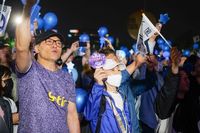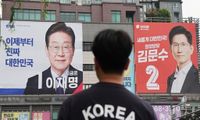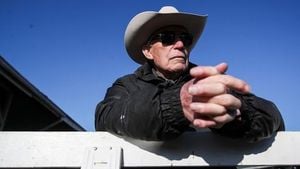South Korea stands at a pivotal crossroads as it prepares to elect a new president on June 3, 2025, in a snap election triggered by the unprecedented impeachment of former President Yoon Suk Yeol. Yoon’s dramatic declaration of martial law in December 2024, a move widely condemned as politically motivated, plunged the nation into turmoil and led to his removal from office in April 2025. This election, held two years ahead of schedule, is more than a routine political event; it is a referendum on the future direction of South Korea’s democracy, economy, and international relations.
Yoon’s attempt to impose martial law marked a dark chapter in South Korea’s democratic history, sparking mass protests and exposing deep political divisions. His impeachment, upheld by the Constitutional Court, was a historic moment—he became the first sitting South Korean president to be arrested and indicted while in office, facing charges including insurrection. The political vacuum that followed saw a rapid succession of interim leaders, with Education Minister Lee Ju-ho most recently assuming acting presidency. The nation’s political landscape remains polarized and volatile, with citizens eager for stability and healing.
The presidential race has narrowed primarily to two frontrunners: Lee Jae-myung of the Democratic Party (DP) and Kim Moon-soo of the People Power Party (PPP), Yoon’s former party. Lee, a left-leaning populist and former human rights lawyer, has maintained a commanding lead in the polls, consistently holding nearly 50% support. He narrowly lost the 2022 election to Yoon and has campaigned on restoring democratic stability, job creation, and social justice. Kim, a conservative figure with approximately 37% support, pledges to rebuild economic confidence and distance himself from the scandal-tainted legacy of Yoon. However, his campaign has struggled to fully break from Yoon’s shadow, even as conservative voters rally behind him.
Adding complexity to the race is Lee Jun-seok of the Reform Party, who commands around 10% support and advocates for reducing presidential power concentration and government ministry consolidation. Other candidates include Kwon Young-guk of the Democratic Labor Party and independent Song Jin-ho, while Hwang Kyo-ahn recently withdrew to back Kim Moon-soo.
Voter engagement has been notably high, reflecting widespread desire for political renewal. Early voting saw a record turnout of 34.74%, the second-highest since early voting was introduced in 2014. On election day, turnout reached nearly 78%, the highest in almost two decades, underscoring the electorate’s urgency to resolve the nation’s crisis.
Both leading candidates have made final campaign appeals that underscore the election’s gravity. Lee Jae-myung’s closing rally in Yeouido Park, near the National Assembly where lawmakers overturned Yoon’s martial law decree, was a festive yet poignant event. Lee framed the vote as a decisive moment to “completely end the insurrection through voting” and called the ballot “the most powerful weapon to end this rebellion and complete the revolution of light.” His campaign has faced serious threats, including an assassination attempt in early 2024, leading to heightened security measures.
Kim Moon-soo’s final rally, held across multiple cities culminating at Seoul’s City Hall, included an apology for Yoon’s martial law and a promise of a fresh political start. However, Kim warned that Lee’s presidency would usher in a “monstrous dictatorship,” criticizing Lee’s security precautions as theatrics. The campaign trail has been marked by sharp rhetoric, with Lee labeling Kim as “Yoon Suk-yeol’s avatar” and Kim accusing Lee of threatening South Korea’s democratic fabric.
At the heart of the election lie critical issues that the new president will inherit. Economically, South Korea faces uncertainty amid a slowing growth rate, with the Korea Development Institute projecting upper 1% growth for 2025 and a gradual decline toward near zero in the coming decades. The Trump administration’s threat of imposing a 25% tariff on South Korean exports, particularly in key sectors like car manufacturing, has added pressure on the export-driven economy. Both candidates emphasize artificial intelligence (AI) and new industries as engines for economic modernization. Lee proposes significant government investment, including KRW 100 trillion (USD 72 billion) earmarked for private AI investments, workforce training, and data center development. Kim similarly advocates for deregulation, public-private AI funding, and expanding nuclear energy to reduce industrial electricity costs.
National security remains a paramount concern. Lee supports a pragmatic foreign policy that balances reaffirming the U.S.-South Korea alliance with stable relations with China and Russia, advocating diplomatic engagement with North Korea and a step-by-step denuclearization plan. Kim takes a more hawkish stance, pushing for enhanced nuclear deterrence, frequent U.S. strategic asset deployments, and openness to NATO-style nuclear sharing, alongside a robust military modernization program. Lee Jun-seok calls for military command restructuring and merit-based promotions to professionalize the armed forces.
Socially, South Korea grapples with a plunging birth rate—0.72 children per woman in 2023, among the world’s lowest—and an aging population that became “super-aged” in late 2023, with 20% over 65 years old. These demographic challenges compound economic and security concerns, demanding urgent policy attention.
Political experts view the election as a turning point. Professor Cho Hee-kyoung of Hongik University anticipates a Democratic Party victory and a shift toward pragmatic foreign relations, moving away from ideologically driven stances that characterized previous administrations. Cho highlights the election’s potential to close the chapter on South Korea’s Cold War-era politics and strengthen democratic institutions, which were exposed as vulnerable during Yoon’s martial law attempt.
However, the nation’s political polarization remains deeply entrenched and emotional, rather than strictly ideological. Analysts note a growing “us versus them” mentality, with harsh rhetoric and mutual distrust defining political discourse. This divide was evident in the campaigns, public protests, and even in the judiciary, where doubts about election fairness and democracy have risen. A recent East Asia Institute survey found over 30% of respondents doubting election integrity, and among ruling party supporters, 30% believed dictatorship could be preferable to democracy.
South Korea’s new president will be sworn in immediately after the election results are validated, foregoing the usual two-month transition period. This expedited inauguration, scheduled for June 4, 2025, reflects the urgency of restoring stable leadership after six months of political limbo. The winner will face immediate and daunting challenges: healing a fractured society, revitalizing a faltering economy, navigating complex international relations amid U.S.-China tensions, and addressing demographic decline.
As South Koreans cast their ballots, the stakes could hardly be higher. The election is not simply about choosing a leader—it is about defining the nation’s democratic resilience and charting a course through a turbulent era marked by internal strife and external pressures. Whether Lee Jae-myung’s vision of a “new morning of hope” or Kim Moon-soo’s promise of renewed economic confidence prevails, the road ahead demands unity, pragmatism, and an unwavering commitment to democratic principles.





